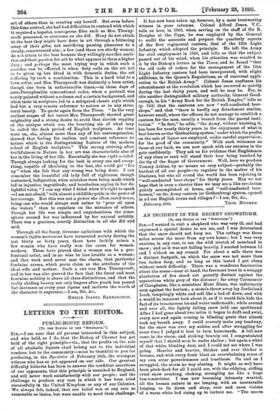LETTERS TO THE EDITOR.
PUBLIC-HOUSE REFORM.
[To THE EDITOR OP TEE " SPECTATOR."]
SIR,—I am sure that all persons interested in this subject, and who hold, as I do, that the Bishop of Chester has got hold of the right principle—viz., that the profits on the sale of all alcoholic liquors shall belong not to the individual vendors, but to the community—must be thankful to you for producing, in the Spedator of February 16th, the strongest witness who has as yet appeared on our side. Our greatest difficulty hitherto has been to answer the confident assertions of our opponents, that this principle is unsuited to Ragland, and will never work satisfactorily with our people; and the challenge to produce any case in which it has been tried successfully in the United Kingdom or any of our Colonies. We always felt, indeed, that our belief was at any rate as reasonable as theirs, but were unable to meet their challenge. It has now been taken up, however, by a most trustworthy witness in your columns. Colonel Alfred Jones, V.C., tells us how, in 1860, when serving on the staff of Sir R. Douglas at the Cape, he was employed by the General to audit the accounts and prepare the quarterly reports of the first regimental canteen, that of the 13th Light Infantry, which adopted the principle. He left the Army for civil employment in 1866, and tells us that the subject passed out of his mind, when his attention was recalled to it by the Bishop's letters in the Times, and he found "that the old code of orders for the management of the 13th Light Infantry canteen had been incorporated, with slight additions, in the Queen's Regulations, as of universal appli- cation to the British Army." Colonel Jones confesses his astonishment at the revolution which has occurred so quietly during the last thirty years, and well he may be. For, to cite another distinguished military authority, General Good- enough, in his "Army Book for the British Empire," tells us (p. 164) that the canteens are now "well-conducted beer- shops," and that "there is hardly any detachment station, however small, where the officers do not manage to establish a canteen for the men, usually a branch from the parent insti- tution." "In fact," he adds, "the Army, without knowing it, has been for nearly thirty years in the enjoyment of what is best known as the 'Gothenburg system,' under which the profits on the sale of liquor are employed, under careful supervision.
for the good of the community." With such witnesses as those at our back, we can now speak with our enemies in the- gate confidently. They ask us for evidence that Englishmen of any class or rank will stand their beer being touched by the tip of the finger of Government. Well, here we produce Tommy Atkins, by no means an easy subject—probably the hardest of all our people—to regulate in the matter of his libations, but who all round the world has been rejoicing in
"well-conducted beer-shops" for thirty years. May we not hope that in even a shorter time we may see a like revolution quietly accomplished at home, and "well-conducted beer. houses," on the Army canteen (or Gothenburg) system, opened in all our English towns and villages ?—I am, Sir, &c.,


































 Previous page
Previous page